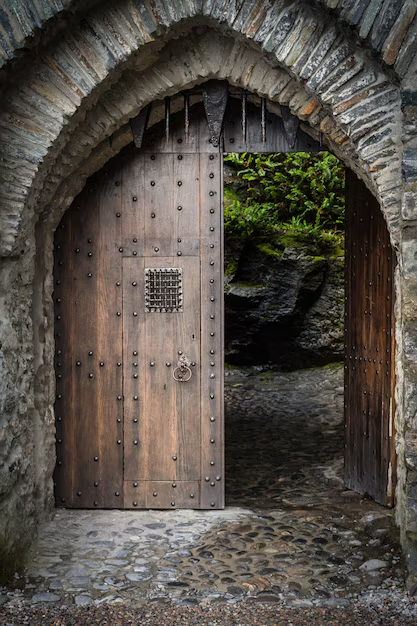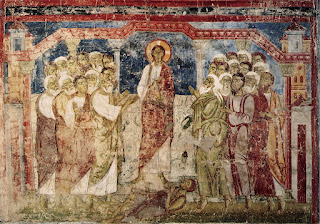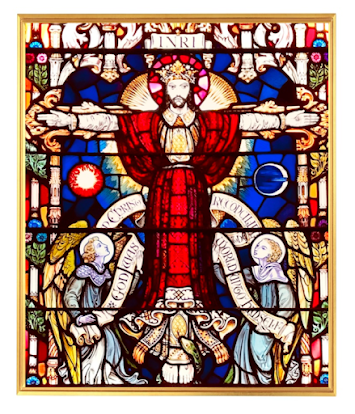Open the Gates
“We must obey God rather than any human authority.” Today's lesson from the Acts of the Apostles is a story about speech, about the authorities trying to hush it up and the Apostles speaking anyway. Their civil disobedience could come with a high price, as Stephen was soon to discover. Yet they kept on speaking, accusing the powers that be of doing away with an innocent man and asserting that this man was the Messiah, the Son of God, and that he had returned from the dead.
Human
authority these days is also trying to muzzle dissent, ordering scholars not to
express any opinions contrary to what the current administration wants to hear.
Our authorities will imprison or deport people for their words. It will hold
research hostage for promoting inclusion. It will even delete any mention of
diversity or the climate from its own websites so as to pretend that
discrimination and global warming don’t exist.
A
college friend of mine, Queer Theology professor Peter Carlson wrote this in a
Facebook post essay about Peter, the Apostles, and the bloodthirsty system run
by human authorities. He wrote:
The people listening to Peter
recognized that he spoke truth about institutionalized violence and power …what
institutionalized power is crucifying people today? What power structures are
so desperate to keep healthcare out of reach that we…will let people die in a
land that claims to protect its citizens? What institutions are driving a world
in which having a roof over one’s head is not considered a right, but a luxury?
… What corporations are so concerned about maximizing profits that they are …
willing to dispense with clean air? How long will we … ignore the financial
structures that do not provide equal access for people of color?
We’ve
all noticed that human authority is getting more and more authoritarian in many
parts of the world. The free press is choked off in Hungary and nonexistent in
Russia. Italy is run by a bona fide neofascist. In India, Muslims are treated
as second-class citizens. The inhumane president of El Salvador calls himself
the “world’s coolest dictator” as he rounds up suspected gang members and
disappears them.
And
our government is not helping. We shut down the Voice of America, the only
place many people in authoritarian countries were able to get real news. We got
rid of the part of the government that provides lifesaving aid around the
world. We’re deporting people to horrific foreign prisons based on such sketchy
criteria as whether they have tattoos, ripping families apart. And much more. It
can come to feel as though all the meanest, nastiest people are the new kings
of the earth.
That’s
why John reminds us that, in the end, Jesus is the ruler of the kings of the
earth.
We
in the global north had been thinking that the days were over when a single
ruler could claim the so-called Divine Right of Kings, when they could say that
the fact that they were in charge meant that God was on their side, so anything
they did was just fine by definition. But then we see our fellow countrymen
calling an elected leader God’s chosen one and ceding more and more power to
that one man, as he starts ignoring judges and claiming immunity. Seems to me,
if you tell a guy that he’s not only the leader of the free world, but he’s also
been specially selected by God, that guy could get a swelled head. Just saying.
While
we were talking about what the human authorities might want to do to us and
ours, my roommate told me that our church should put PRIVATE signs on
the doors, that this will discourage intrusions by human authorities who would,
say, take away a deacon. She said that in her immigration safety training, she
had learned that such a sign can keep law enforcement out without a proper
judge’s warrant. I wonder, though, first of all, whether that would really
work, and also whether just huddling together for safety doesn’t lose something
crucial about what it means to be a church. Would it only deflect ICE? Who else
might be discouraged by such a sign?
Sometimes
we do want to shut our doors and lock them. We want to keep our opponents out
of our safe space. I mean, why not stay in this cozy and very attractive room,
where we know everyone is on the same page? Then maybe those scary people will
leave us alone.
In
the Gospel scenes with Thomas, the disciples are scared, hiding from the human
authorities. They’ve got incredible news to share, that Jesus rose after a
horrible death and is just the firstborn of the dead who will rise. But they’re
putting the light of that news under a bushel basket for fear, not of all the
Jews—they themselves were Jews; the word Christian hadn’t been invented
yet—but for fear of human authorities like that high priest and his temple
police. It’s interesting to see a house of worship that has its own police
force.
Why
wasn’t Thomas there for the first visit from Jesus? We don’t know. Maybe he’d
drawn the short straw to go out for provisions. Maybe he was too scared even to
be with the others, in case those temple police showed up at that locked door. We
could say that Thomas was locked up even more than the others because his heart
was barricaded against anything that might turn out to be false hope. As far as
Thomas could see, not yet having seen Jesus alive, it was all over. They’d been
conquered, their movement squelched. He probably figured it was only a matter
of time before the rest of them met Jesus’ fate.
But
let’s cut Thomas some slack. I mean, if a friend tells you they’ve seen your
mentor alive after being crucified and buried, you’ll probably be skeptical,
too. If all your friends say so, that might give you pause, but still—it could be a mass hallucination
or, worse, a mere metaphor.
Speaking
of metaphors, there’s a deeply absurd British comedy I saw a number of years
ago called The Adventures of Baron Munchausen. The premise is that
there’s a war going on and this city is under siege. Everyone is barricaded
inside the city walls, terrified of the siege engines and the cannonballs.
While the leader of the city insists on conducting a battle plan based on
Reason and Logic, this old man calling himself a baron shows up and tells a
troupe of actors that the whole war is his fault and that he can stop it. They
all assume he’s crazy. Then, after telling the actors and townsfolk a fabulous
tale of his travels and exploits—a story almost as preposterous as the one the
disciples are telling Thomas—The Baron declares that the war is now over and
commands, “Open the gates!” A few at a time, the city people join him in this
illogical cry. The Baron strides toward the entrance to the main street with a
growing crowd at his heels. “Open the gates!” The rational mayor keeps saying no!
Don’t do it! Outside the gates there are enemies waiting to attack! But the advancing
crowd gets bigger. “Open the gates!” And they get there, and they open them,
and the battlefield is deserted. The crazy old guy was right. All the people
needed to do was open the gate, and there, outside the walls, they found peace.
“Peace
be with you,” Jesus says, gate-crashing the locked upper room. He offers his
friends two gifts: peace and the Holy Spirit. One thing he doesn’t offer them is
what they maybe think they need most—safety. That’s why they’re back in the
same room behind the same closed doors when he comes the second time.
I
wonder what happened between that locked room and Peter’s public avowal of
Jesus’ resurrection and divinity in today’s reading from the Acts of the
Apostles? Well, back in Acts 2, Pentecost happens. The Holy Spirit blows in and
pushes them out of that room and into the streets, like Baron Munchausen
shouting, “Open the gates!” And then all kinds of gates start to open. The
locked door of language differences dissolves. The barricade of avarice falls
as the new followers share everything in common. The confinement of disability
breaks as a lame man is healed. Later on, a prison wall crumbles and Peter
opens the Jews-only gate to baptize a Roman centurion.
This
time, when the authorities round them up for talking about Jesus, they are
unafraid. The Holy Spirit is a strong wind that blows down closed doors, even
those we close on ourselves.
When
the disciples’ gates are opened, the rulers they’re afraid of are still there,
but so is that completely irrational peace. It no longer matters to them what
the human authorities think. All that matters is the crazy truth. An
authoritarian regime had killed Jesus, but he couldn’t be muzzled, not even on
a cross. Not even in a sealed tomb. When his followers fully grasp this
reality, there is no longer anything or anyone that can shut them up.
Peace
and the gusty Spirit turn out to be just what they need to get them out of that
room and into the public square, where they can fill Jerusalem and the world
with the crazy news that Jesus is risen, that the human authorities, in all
their brutal inhumanity, could not finally win. By the battering ram of the
Holy Spirit, the Apostles are enabled to say like Professor Carlson, “Stop
accepting the world’s values. Stop thinking you have to participate in the
world’s power structures … Stop thinking you can’t make a difference. [Jesus’]
wounds are all around you. Finger them. Shove your fist in them. Believe.”
I
know it’s not entirely safe out there these days for people who speak unwelcome
realities to human authorities. Reality is likely to be called fake news. Like
with the Apostles, today there are protesters who are bringing the blood of the
marginalized and suffering down on powerful heads, calling out cruelty and exploitation
and genocide, and that’s a risky business. It could get you arrested. Deported.
Stoned. Crucified.
The
thing is, Jesus never guaranteed us safety. Instead, he promised us peace
unlike the world’s peace, and like we just sang, “The peace of God, it is no
peace.” But God did send the Holy Spirit to give us conviction and courage and
maybe an occasional kick in the pants, to blow down our doors and get us out
into a world that needs to hear our crazy story of resistance and resurrection.
So in spite of the risks, in spite of authorities, kings and powers, in spite
even of adversaries that might be lying in wait outside the walls, I say, “Open
the gates!”



Comments
Post a Comment